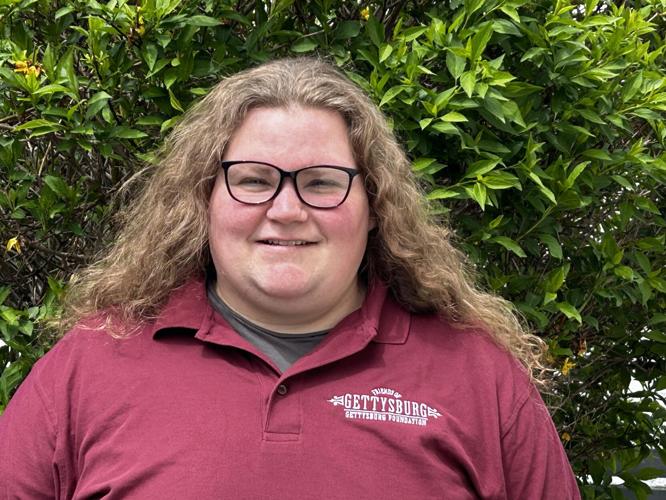Cindy Beaston has conversations with Civil War generals.
“This is my friend, Pete Longstreet. I talk to him,’’ she said while showing a photo of one of Confederate Gen. Robert E. Lee’s lieutenant generals at a meeting of Columbia’s Civil War Roundtable. “We have a very close relationship, and he’s OK with that.’’
Because Beaston is committed to explaining the Civil War in human terms, she includes her conversations with dead generals as part of her presentation.
But she has nothing good to say about Gen. John B. Gordon, the Confederate whose troops invaded York County and planned to cross the Columbia-Wrightsville bridge into Lancaster County before the battle of Gettysburg.
“If anyone ever says I have said anything positive about Gen. Gordon,’’ she told a Roundtable audience assembled at the Columbia Public Library April 20, “I will deny it.’’
Beaston, a Columbia native and Harrisburg Area Community College graduate in history, founded the General Welsh Post 118 Roundtable two years ago. She named it, appropriately, for Columbia native and Union Gen. Thomas Welsh.
“History’s always been my thing,’’ the 34-year-old Beaston explained following the program. “I emphasize the humanity of it. They fought each other for four years. I want other people to be projected into that. I’m hoping to get people to care.’’
Wearing a T-shirt emblazoned with Gen. Lee’s photo, Beaston seemed to accomplish her goal at the April 20 meeting.
Beaston’s subject was Lee’s retreat from the defensive trenches at Petersburg, Virginia, to the surrender site at Appomattox Courthouse on April 9, 1865. She described Lee’s efforts to avoid losing to the Union’s Army’s overwhelming numbers of soldiers and resources and Union Gen. U.S. Grant’s relentless war of attrition.
Much of her discussion, illustrated with appropriate PowerPoint images, centered on generals on both sides. For example, Lee, whose loyal troops were willing to follow him anywhere, and Grant, about whom she observed, “I love that man.’’
Listeners came away with a clearer understanding of the strategies of Lee’s and Grant’s armies and a bundle of anecdotes about the generals themselves.
History has been Beaston’s passion since she was a young girl. She has concentrated on the Civil War for 11 years. She reads in her spare time, after serving as a lifeguard, swim instructor and water aerobics instructor at the Hempfield recCenter.
Beaston presents most of the roundtable’s monthly programs. Noted Civil War historian and author Scott Mingus Sr. will present a talk on Abraham Lincoln’s funeral trail in August.
All presentations are free and open to the public at the Columbia Library, 24 S. 6th St. The next meeting will be held May 11 at 11 a.m. Beaston will present a Mother’s Day program titled “The Backbone of Our country: The Women of the Civil War.’’
Other roundtables
The Lancaster Civil War Roundtable disbanded in the early 2020s, so Columbia’s is the only roundtable in Lancaster County. Roundtables are active in York, Hershey, Harrisburg and elsewhere in the country.
Why the enduring interest in a war that ended nearly 160 years ago?
The war is of interest in itself, but so is its never-ending aftermath.
Beaston mentioned one way the war continues to surface in the 21st century. The number of Civil War dead continues to rise — now at well over 700,000, a high number that no one cited until recent years. “Bodies are always being found,’’ she said. “They’re rising up from shallow graves.’’
Jack Brubaker, retired from the LNP staff, writes “The Scribbler” column every Sunday. He welcomes comments and contributions at scribblerlnp@gmail.com.





